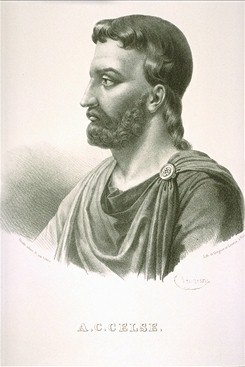
I’ve already discussed Paracelsus in connection with his belief in elementals, but there was more to him than that. I suppose he was what would be considered a Renaissance man, with interests ranging from medicine to astrology and alchemy. While many of his Hermetic occult beliefs would be considered magical by modern thinking, he did not consider himself a magician.

He was born in 1493 under the name Phillippus Aureolus Theophrastus Bombastus von Hohenheim, but later came to call himself Paracelsus, meaning “greater than or equal to Celsus.”
So who was Celsus? In this case, it wasn’t the critic of Christianity I previously wrote about, but rather Aulus Cornelius Celsus, believed to have lived during the reigns of the Emperors Augustus and Tiberius.

Little is known about this man’s life, and most of his work has been lost, but his claim to fame is having written an encyclopedia.

Only the volumes on medicine survive, but he apparently also wrote about agriculture, law, philosophy, history, and military service. By adopting the name “Paracelsus,” Hohenheim was likely claiming that his own knowledge rivaled that of Celsus, which almost certainly was part of what led to his reputation as arrogant.

After graduating from the University of Basle, Paracelsus took on the lifestyle of a wandering ascetic, journeying throughout Europe and other nearby lands in search of folk wisdom on alchemy and related topics. He continued to practice medicine, agreeing to heal anyone regardless of social class. For all of the weird ideas on talismans and gnomes that he embraced, he also made some legitimate medical advances. For instance, in opposition to the prevailing practices of the day, he believed that wounds could heal on their own as long as they did not become infected. He used mercury to treat what would eventually become known as syphilis, named zinc, and created laudanum. Perhaps his most significant belief was the importance of experimentation and observation in medicine, and he totally rejected the works of Galen and his belief in the balance of the four humors, which were standard in Paracelsus’ day. Perhaps it wouldn’t be too far off the mark to consider Paracelsus a renegade scientist.


Thanks for posting this! In regards to that last picture, I know there’s a lot of rumors about the “Azoth” on the sword’s pummel referring to a spirit he summoned and stuck inside a jewel on the hilt of the sword. However, “Azoth” is actually the beginning of an alchemical word for mercury (the chemical element as well as a base ingredient of the Philosopher’s Stone). So the pummel is probably in reference to mercury being one of the most important elements in alchemy and it may even have contained mercury like a modern thermometer. (Well, not so modern anymore, since new thermometers use colored alcohol instead of the poisonous mercury to measure the temperature.)
You’re welcome. There are a lot of pictures of Paracelsus with that Azoth sword.
Pingback: Gnomic Utterances | VoVatia
Pingback: Ariel View | VoVatia
Pingback: She’s Come Undine | VoVatia
Pingback: Burning Up for Your Love | VoVatia